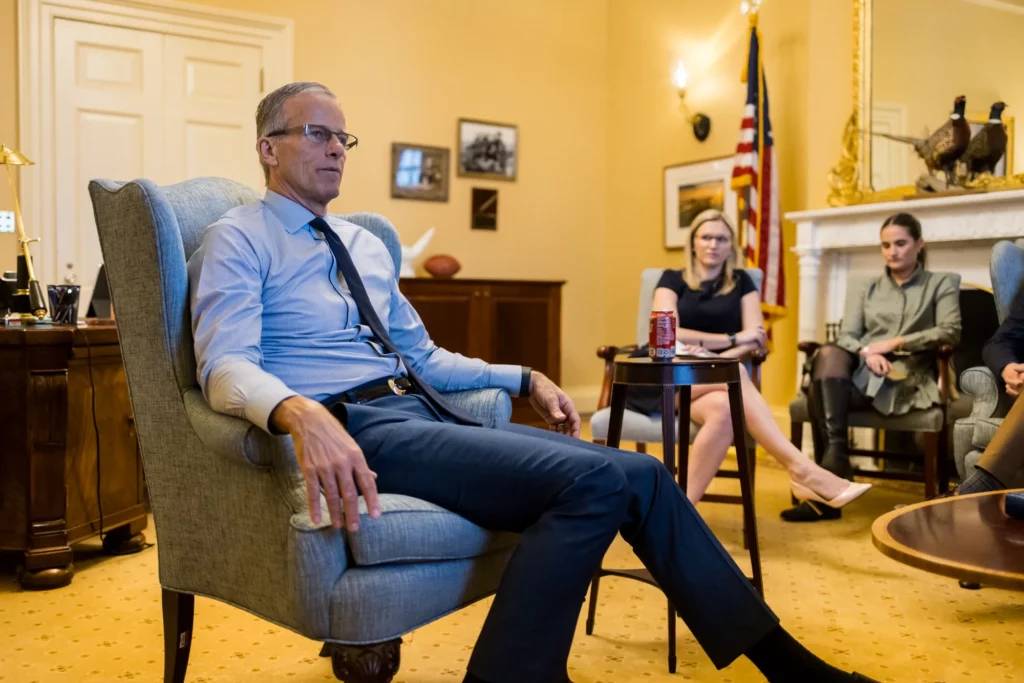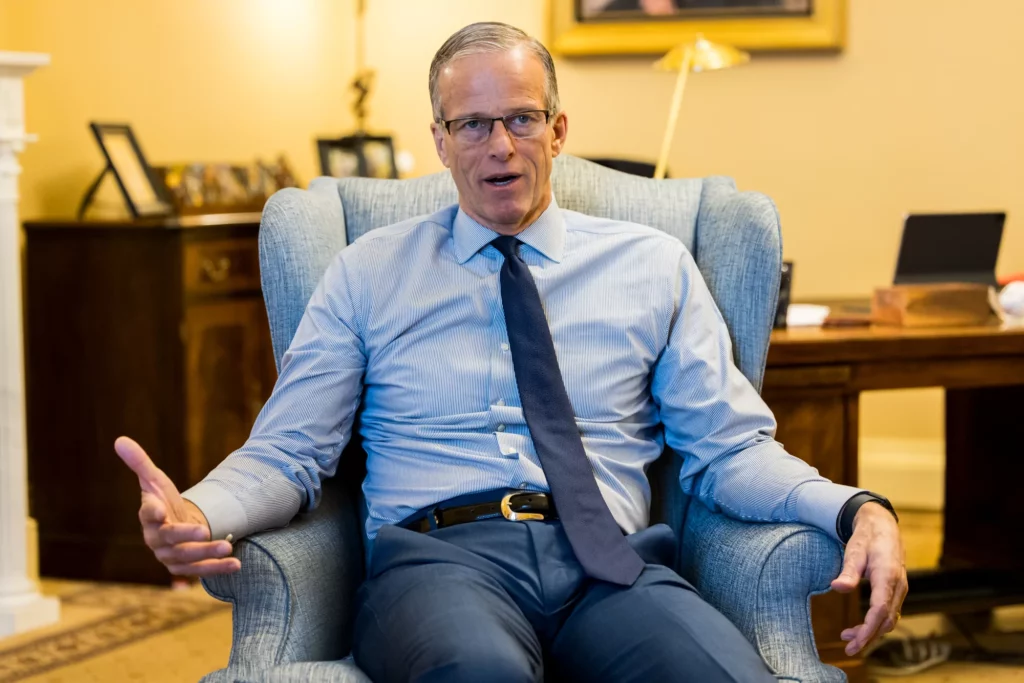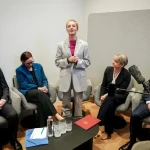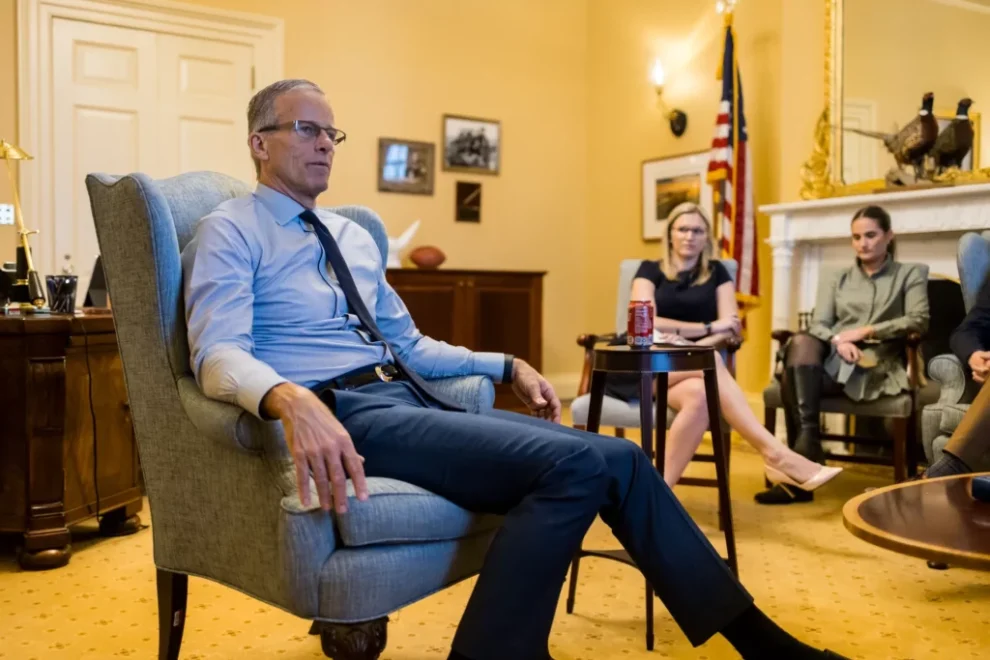EXCLUSIVE — Senate Majority Leader John Thune (R-SD) has no illusions about the challenges ahead as he tries to execute an ambitious conservative agenda, even with Republicans controlling the White House and both houses of Congress. He is already being put to the test on whether he can go big without overpromising.
In a wide-ranging interview with the Washington Examiner after the certification of President-elect Donald Trump’s Electoral College win on Jan. 6, Thune touched on his legislative priorities, vision for budget reconciliation, and working relationships with the incoming president and House Speaker Mike Johnson (R-LA) that will prove crucial to his success.
The sit-down interview in his new Senate office was Thune’s first with a print outlet since assuming his role at the start of the new Congress on Jan. 3.
Thune called his relationship with Trump “great” and detailed their near-daily contact. He is also determined to keep a healthy line of communication with Johnson after past government funding bills created tensions between his predecessor, Sen. Mitch McConnell (R-KY), and then-Speaker Kevin McCarthy.
He rose to one of the most powerful positions in Washington as Republicans have unified control of the federal government for the first time since halfway through Trump’s first term. But the majorities are narrow, and Republicans are already having a strategy fight over how to proceed on their policy priorities. Thune conceded it will be “challenging.”
The following transcript of Thune’s interview was lightly edited for clarity and brevity.

Washington Examiner: With a Republican Senate, House, and White House, what will your priorities be in the coming months?
Thune: “It’s going to be, starting next week, all nominations all the time. The one thing I remind people of — and I say this unfortunately, it’s not something that I think we should be proud of — but two-thirds of the Senate’s time is now spent on personnel. We’ve become kind of a human resources factory. Part of that is we’ve got a job to do under the Constitution when it comes to executive branch nominees and everybody on the judiciary. There are 45 vacancies right now on the judiciary, which is fewer than there was the last time that Trump came into office. Obviously, we’ll be focused on that and all the executive branch nominees. But it’s taken a lot longer now. Obama’s first 12 nominations were completed in 15 days. It took 42 days for Trump, 50 for Biden. We’re sliding in the wrong direction, and I think it’s important that we get back to the Obama standard. The president ought to have the chance to get his folks in place and get them in time to actually be able to implement his agenda. That’s going to be the way we’re going to be approaching nomination. We’re going to move fast, aggressively, and hopefully we’ll see what kind of support we get from the Democrats. Legislatively, we’re having a fairly robust discussion about reconciliation and how to use the opportunity that we have, which doesn’t come along very often. It doesn’t last very long, to get as much done as we possibly can there. We got a lot of deadlines coming up. We got a CR that expires March 14, debt limit coming up later this year. Our areas of focus are going to be strengthening the economy — and that’s a function largely of tax, regulatory policy, some energy policy — and obviously national security. We got an awful lot of folks who believe that our military readiness is in a situation where we need to be investing more heavily. The border I would probably put at the top of the list. I think everybody understands we’ve got to fix the mess at the southern border, and all of the implications of that, and all the conditions in the country that flow from that.”
Washington Examiner: What are some of the “reach” goals on reconciliation beyond taxes, energy, the border, and national defense that Republicans may or may not be able to get through the parliamentarian?
Thune: “There are a ton of things that we would love to be able to do, and I get good ideas every day. There are a lot of folks here who haven’t been through this before. I’m told that there are only 83 House Republicans who were here in 2017, the last time that we had the majorities and used reconciliation to do the tax bill. I would love to see what we can do in the area of regulatory reform. But it has to affect spending and revenues. That’s got to be the principal consideration for reconciliation. As we think through those possibilities, it’s with an eye toward things that we can do that are consequential and that we’ve been trying to get done for a while. It’d be nice if there was more cooperation among Democrats, but there just isn’t. The middle is gone in terms of Democrats. You lost Manchin, you lost Sinema, and they were the only two who defended the filibuster the last time around. There are things we have to do at 60 votes: appropriations bills, Farm Bill, if we do something in the area of AI, for example. Those are the issues on which there’s generally some bipartisan agreement. I hope there still is the basis to get some things done that we need to get done in a bipartisan way. We’re clearly looking at reconciliation now in determining what are the parameters of what would be potentially achievable. Some of the stuff you got to have those conversations and take a run at the parliamentarian. Democrats significantly expanded the scope of it but also ran into resistance on some things they were trying to do that had been on their policy agenda list for a long time. It’s how effective you are making the arguments and how persuasive you are.”

Washington Examiner: There are some within the Senate Republican Conference who are wary of Senate Parliamentarian Elizabeth MacDonough. They want to make sure there’s consistency with the parliamentarian and what’s allowed to be included under reconciliation legislation. Do you trust MacDonough? You’ve stated you want to push the envelope on what can get through.
Thune: “We do. Clearly, the Democrats successfully gave us a template by expanding the scope of reconciliation and used it in ways that hadn’t been used before. It made it through the parliamentarian. There were a number of things they tried to do through their two reconciliation bills that didn’t make it to the parliamentarian. The minimum wage got knocked out. The clean power plan got knocked out. They wanted to legalize the Dreamers, that got knocked out. Those were all knocked out by the parliamentarian. Ultimately, she is the referee. The six-step Byrd test that we have to subject to here in the Senate, there’s certainly some subjectivity associated with that. But we want to do everything we can to make the argument for why what we’re trying to do fits within the contours of what the law allows and the Byrd Rule allows. We’ll make those arguments to her, and we expect her to be a fair arbitrator.”
Washington Examiner: Trump in recent weeks has given lawmakers whiplash on matters involving stopgap government funding, raising the debt ceiling, and how many reconciliation bills to draft. What is your working relationship with Trump like, and how much are you in contact with him as you consider legislation such as reconciliation and confirming his nominees? How do you envision the balance between how much Congress leads on issues and how much you allow Trump to take the reins?
Thune: “The relationship is really strong. We were texting until midnight last night. I talked to him earlier today by phone. He’s obviously very engaged, and we need him engaged because he’s going to be key to what the traffic will bear in both the House and Senate. The House has a very narrow majority. The success that they have is going to be largely dependent upon him bringing along Republicans, particularly with regard to things that we do through reconciliation. Once he’s officially inaugurated two weeks from today, he’ll get to work right away with executive orders, executive action, things he can do administratively. But there are things they’re going to need Congress for. We want to make him as successful as possible, and the only way for that to happen is the House and Senate have to be working with him and his team. There’s a great foundation there with ongoing dialog and conversation about how to get his agenda through, knowing that the politics of it is challenging. We’ve got narrow majorities. Fortunately, we have a little bit of cushion here in the Senate. But the House is really, really narrow. He’s aware of that dynamic, and I think there’ll be a need for a real strong line of communication between the House, the Senate, and the White House.”

Washington Examiner: One element of that is your relationship with House Speaker Mike Johnson. Former Senate GOP Leader Mitch McConnell and former House Speaker Kevin McCarthy didn’t always see eye to eye, including several government funding battles. How is your relationship with Johnson, and how do you see yourself working with him to pass Trump’s agenda
Thune: “Really strong, again. I was with the House Republicans on Saturday at their retreat. We’ve been in touch today. We’re getting together tomorrow. There’s a lot of strong lines of communication, and I think both of us are trying to understand that we have diverse caucuses in different dynamics. The Senate has rules that we’re subject to that the House isn’t, particularly the 60-vote threshold on anything that can’t be accomplished through reconciliation. On their side, just a very narrow majority. There’s a lot of diversity — geographically, ideologically — within our conferences, and trying to figure out how to balance it all and understand what the limitations are in both the House and Senate based not only on our rules and our procedures but the political dynamics that we have at work. Those are things that we are regularly communicating about. I don’t underestimate the challenge that he has with that majority. In my last two years in the House, we had a 221-214-seat majority. That was really challenging. That was before social media. We understand, and I think are very realistic, about what it’s going to take to get things done and realize how important a strong relationship is to that.”
Washington Examiner: What is your relationship like with McConnell going forward? He’s not in leadership anymore, but will you lean on him for guidance as you navigate political challenges as leader?
Thune: “He is the master of how this place works. When it comes to procedural questions, historical questions, there isn’t anybody who’s probably more of an encyclopedia about this place. We’ll take full advantage of his knowledge and experience when necessary. We obviously welcome his input and thoughts about how we can improve and do things better. If you think about the amount of time he’s been here and all the different things he’s seen through the years, there isn’t much that he hasn’t experienced. It’s useful to have somebody that has that perspective, and I think it just lends into the history of this place and what’s achievable. Sen. McConnell’s only been a very pragmatic leader who wants to get results and knows what it takes to get there. So, yes, we will take full advantage of his expertise.”
Ramsey Touchberry is a congressional reporter for the Washington Examiner. David Sivak is Congress and campaigns editor for the Washington Examiner.
























